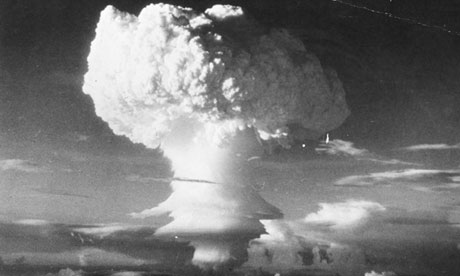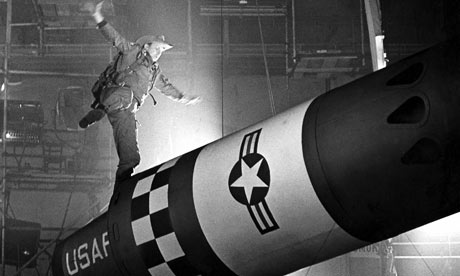Pope Francis' recent comments on abortion and gay rights have stunned the world. (photo: Gregorio Borgia/AP)
Is the Pope Catholic?
21 September 13
 s
the pope Catholic? Forgive the posing of a question that is usually
rhetorical, the absolute benchmark of certainty, and traditionally
regarded as even more settled than the one pertaining to the lavatorial
arrangements of bears.
s
the pope Catholic? Forgive the posing of a question that is usually
rhetorical, the absolute benchmark of certainty, and traditionally
regarded as even more settled than the one pertaining to the lavatorial
arrangements of bears.
But the most alien element of doubt has been introduced to the inquiry following the pontiff's interview with a Jesuit magazine,
in which he criticises his church's "obsession" with gay people,
contraception and abortion, and declares that the Catholic hierarchy
must dispense with power-playing. "We have to find a new balance," said
Francis, "otherwise even the moral edifice of the church is likely to
fall like a house of cards ... The people of God want pastors, not
clergy acting like bureaucrats or government officials." Well. The
immediate thought is that you wouldn't want to be his life insurer at
the moment. But we shall come to the form book on modern reforming popes
later.
So incendiary were the interview's contents evidently
deemed that it was practically smuggled out of the Vatican, with so few
senior officials reportedly aware of its tenor that the consensus is
that it has sent "shock waves" around the Catholic world. Its impact
more than doubles down on the seismic jolt effected by the pope when he
wandered back to the press seats on his plane out of Brazil a couple of
months ago and addressed the issue of gay people with the words: "Who am I to judge?" That can no longer be dismissed as the sort of lunatic thing one might say having consumed an Ambien
and several miniatures at 38,000ft - although one has to wonder if
those hailing this latest interview as just what the church ordered have
partaken of something similar down here on Earth.
After all, if we think of the Vatican as a vast and
hugely successful multinational corporation, then this interview would
appear to be the equivalent of a profits warning. At the very least, it
would seem to be tinkering with the formula of the biggest spiritual
brand in the world, analogous to Coca-Cola changing its famous recipe in 1985.
I need hardly remind you how that one worked out. Familiarity is what
people want in a source of comfort, be it religion or a carbonated
beverage.
He is a South American, so perhaps revolutionary
spirit courses through Francis's veins. But what, pray, does the
Catholic church want with doubt? What does it want with humility? What
does it want with that most false of modern idols, relevance? People
have been claiming for centuries that the church needs to modernise to
survive - reports of its brand demise being revealed as laughably
premature every time. Even today, popular myth insists it is the largest
landowner in the world, though more realistic estimates place it behind
King Abdullah of Saudi Arabia, with our own queen in the top spot. Still, it's fair to say the Holy See isn't doing badly.
It's not broke, in any sense of the word - unless
you're one of the countless unfortunates to have suffered at the hands
of its edicts or its evildoers, of course - so what in his employer's
name is Francis up to with this suggestion that something needs to be
fixed?
The answer we are being led towards is more
sensational than anything he has said so far. And given the spiritual
organisation with which we are dealing here, it is obviously necessary
to eliminate all other possibilities before we can accept it as the
truth. But crikey, if he carries on like this, we may have to consider
the almost unthinkable: that a good man has been made pope.
Traditionally, such an outcome has felt beyond all realms of reason and
possibility, with the notion that a decent sort of chap could politick
his way to the top of Vatican's greasy poll more outlandish even than
the idea that such a soul could take the White House.
All of which brings us back to the nagging conspiracy
theory that a good man who becomes pope has a life expectancy slightly
longer than a fruit fly. The last nice reformer to occupy the office was
John Paul I, a famously warm chap who immediately moved to humanise the
papacy. Just as Francis has shunned the grandeur of the papal apartment
in favour of a simple room, so John Paul spoke in the first person,
declined to be borne aloft on the papal throne (until he was pressured
into it), refused a papal coronation in favour of a more low-key
investiture, and sent the clearest of signals that he was a moderniser. A
smear campaign promptly cast him as borderline incapable, with one
archbishop letting it be known that "They've made Peter Sellers pope."
He was dead 33 days after his election, with an autopsy deemed surplus
to requirements.
The Lord moves in mysterious ways - though not a
thousandth as mysterious as those of his senior personnel from time to
time - so there is no earthly possibility of predicting how long the
window of opportunity enjoyed by Pope Francis is likely to be. He has
certainly made a lively start. But the idea that comments warmed to by
atheist liberals - those great irrelevances to the church - represent
some sort of material change in the complex doctrinal politics of his
organisation seems doctrinally naive. Is it about to get livelier? Is
the pope Catholic?






 he
intoxication of war, fueled by the euphoric nationalism that swept
through the country like a plague following the attacks of 9/11, is a
spent force in the United States. The high-blown rhetoric of patriotism
and national destiny, of the sacred duty to reshape the world through
violence, to liberate the enslaved and implant democracy in the Middle
East, has finally been exposed as empty and meaningless. The war machine
has tried all the old tricks. It trotted out the requisite footage of
atrocities. It issued the histrionic warnings that the evil dictator
will turn his weapons of mass destruction against us if we do not bomb
and "degrade" his military. It appealed to the nation's noble sacrifice
in World War II, with the Secretary of State John Kerry calling the
present situation a "
he
intoxication of war, fueled by the euphoric nationalism that swept
through the country like a plague following the attacks of 9/11, is a
spent force in the United States. The high-blown rhetoric of patriotism
and national destiny, of the sacred duty to reshape the world through
violence, to liberate the enslaved and implant democracy in the Middle
East, has finally been exposed as empty and meaningless. The war machine
has tried all the old tricks. It trotted out the requisite footage of
atrocities. It issued the histrionic warnings that the evil dictator
will turn his weapons of mass destruction against us if we do not bomb
and "degrade" his military. It appealed to the nation's noble sacrifice
in World War II, with the Secretary of State John Kerry calling the
present situation a "







